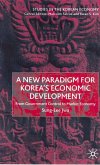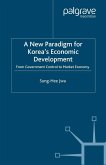Very few developing countries have successfully industrialised. Many are under pressure from international organisations to achieve 'self-sustainable' industrialisation. This is why Korea's case is particularly interesting. There have been many attempts to explain the causes of Koreas' economic miracle. These have focused mainly on the internal factors such as the discipline of the Korean workforce and export-promotion policies. The present study however shows that these factors contributed to Korea's impressive growth but do not explain the reasons for her success. External factors have been more important, the Japanese economy in particular. This book examines therefore in detail the impact of Japan's economic growth on the Korean economy, in particular the stimulating effects of trade, sub-contracting, relocation of industry, investment, loans and technology transfer. It demonstrates how Japan provided a range of goods, services and capitals which were precisely what the newlyindustrialising country needed.








